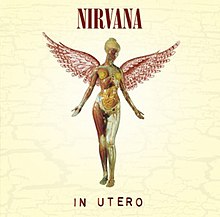| In Utero | ||||
|---|---|---|---|---|
 | ||||
| Studio album by | ||||
| Released | September 21, 1993 | |||
| Recorded | February 13–21, 1993[1]
| |||
| Studio | Pachyderm (Cannon Falls, Minnesota) | |||
| Genre | ||||
| Length | 41:23 | |||
| Label | DGC | |||
| Producer | Steve Albini | |||
| Nirvana chronology | ||||
| ||||
| Singles from In Utero | ||||
| ||||
In Utero is the third and final studio album by the American rock band Nirvana, released on September 21, 1993, by DGC Records. After breaking into the mainstream with their second album, Nevermind (1991), Nirvana hired Steve Albini to record In Utero, seeking a more complex, abrasive sound that was reminiscent of their work prior to Nevermind. Although the singer and primary songwriter Kurt Cobain claimed that the album was "very impersonal", many of its songs contain heavy allusions to his personal life and struggles, expressing feelings of angst that were common on the band's previous album.
The album was recorded over two weeks in February 1993 at Pachyderm Studio in Cannon Falls, Minnesota. After recording finished, rumors circulated that DGC might not release the album due to Albini's abrasive and uncommercial sound. The album was mastered by Bob Ludwig to achieve a more desirable sound for both Nirvana and their label. The band later hired the producer Scott Litt to remix the singles "All Apologies", "Heart-Shaped Box" and "Pennyroyal Tea".
In Utero was a major commercial and critical success. Critics praised the album's raw, unconventional sound and Cobain's lyricism. It reached number one on the US Billboard 200 and UK Albums Chart; "Heart-Shaped Box" and "All Apologies" reached number one on the Billboard Alternative Songs chart. The album is certified five times platinum in the US and has sold 15 million copies worldwide. It was the final Nirvana album before Cobain's suicide in 1994, six months after the album's release.
"Pennyroyal Tea", planned as a single prior to Cobain's death, was released in 2014 and reached number one on the now-defunct Billboard Hot 100 Singles Sales chart.
- ^ Willman, Chris (September 12, 2013). "Nirvana's 'In Utero' Turns 20: The Drama Over Kurt Cobain's Last Musical Testament". Yahoo! Music. Archived from the original on March 11, 2014. Retrieved October 22, 2013.
- ^ Jovanovic, Rob (2004). Nirvana - The Recording Sessions (1st ed.). Firefly. p. 97. ISBN 0-946719-60-8.
- ^ Kohrman, Miles (September 27, 2013). "Reach Creative Nirvana With This Grunge Masterpiece". Fast Company. Archived from the original on October 20, 2020. Retrieved November 19, 2020.
- ^ "Noise Rock Guide: History and Characteristics of Noise Rock". MasterClass. June 24, 2021. Archived from the original on July 25, 2021. Retrieved July 25, 2021.
- ^ "10 Essential '90s Alt-Rock Albums". Treble. July 25, 2013. Archived from the original on November 11, 2020. Retrieved November 19, 2020.
- ^ Blatt, Ruth (September 16, 2013). "Nirvana's 'In Utero' And The Problem Of Authenticity At Work". Forbes Magazine. Archived from the original on November 11, 2020. Retrieved November 19, 2020.